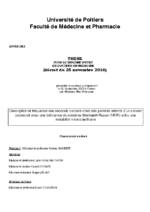Thèse d'exercice
Franques Paul
Description et fréquence des seconds cancers chez des patients atteints d'un cancer colorectal avec une déficience du système Mismatch Repair (MMR) et/ou une instabilité microsatellitaire
FrançaisConsulter le texte intégral (format PDF)

Résumé
Français
Description et fréquence des seconds cancers chez des patients atteints d'un cancer colorectal avec une déficience du système Mismatch Repair (MMR) et/ou une instabilité microsatellitaire
Introduction : Les cancers colorectaux (CCR) présentant un déficit de la réparation des mésappariements de l'ADN et/ou une instabilité microsatellitaire (dMMR/MSI) représentent environ 15% des CCR localisés et 3% des CCR métastatiques. Les CCR dMMR/MSI peuvent être dus à un syndrome de Lynch (SL) ou à un mécanisme épigénétique lié à l'âge, principalement par hyperméthylation du promoteur du gène MLH1. Il est bien établi que les patients atteints de SL ont un risque élevé de cancer, mais il n'y a pas de données concernant le risque d'un second cancer dans les CCR dMMR/MSI sporadiques.
Patients et méthodes : Nous avons étudié le risque de présenter un autre cancer dans une cohorte prospective de 484 patients avec un CCR dMMR/MSI. Nous avons évalué l'incidence d'un autre cancer (antérieur ou ultérieur au diagnostic du CCR dMMR/MSI), quel que soit le stade ou le site tumoral.
Résultats : Nous avons identifié 116 patients avec un cancer antérieur ou ultérieur (24,0%) avec une moyenne de 1,3 cancers par patient avec au moins une autre tumeur. Les sites tumoraux les plus représentés étaient les tumeurs de la peau (19,6%) et les cancers du sein (19,6%). Il n'existait pas de différence du nombre de patients ayant un autre cancer entre les patients ayant un CCR dMMR/MSI lié au SL (26,1%) et les patients ayant un CCR dMMR/MSI sporadique (24,3%). Aucun facteur de risque ne semble évident pour identifier le risque d'un autre cancer dans notre cohorte, les populations avec et sans autres cancers sont tout à fait comparables. En revanche dans le groupe de patients avec un CCR dMMR/MSI sporadique les patients avec un autre cancer avaient plus souvent un CCR BRAF sauvage dMMR/MSI (32,9%) que les patients sans autre cancer (18,9%).
Discussion : Il semble donc important de surveiller les patients ayant des antécédents de CCR dMMR/MSI, même s'il s'agit d'un cas sporadique étant donné le nombre élevé d'autres cancers. Nous allons analyser ces autres cancers pour déterminer le statut MMR/MSI afin, d'une part comprendre le taux élevé d'autres cancers, et d'autre part adapter le suivi voire la prise en charge thérapeutique de cette population atteinte de CCR dMMR/MSI.
Mots-clés libres : cancer colorectal, instabilité microsatellitaire, déficit de réparation des mésappariements de l'ADN, second cancer primitif, syndrome de Lynch.
- Cancer colorectal -- Récidive (médecine)
- Syndrome de Lynch
- Épigénomique
English
Description and frequency of others primary malignancies in patients with deficient mismatch repair system or/and with microsatellite instability colorectal cancer
Introduction : Colorectal cancers (CRC) with Mismatch Repair deficiency and/or microsatellite instability (dMMR/MSI) represent about 15% of localized CRC and 3% of metastatic CRC. dMMR/MSI CRC can due to a Lynch syndrome or an age-related epigenetic mechanism mostly by hypermethylation of MLH1 promoter. It is well recognized that patients with Lynch syndrome have a high lifetime risk of cancers but on the other hand there is no data concerning the risk of a second cancer in sporadic dMMR/MSI CRC.
Patients and methods : We described the risk to have another cancer in a prospective cohort of well-characterized 484 patients with a dMMR/MSI CRC. We evaluated the incidence of another cancer (previous or second cancers), whatever the stage or the tumor site.
Results : We identified 116 patients with a previous or a second primary cancers (24.0%) with an average of 1.3 cancers per patient with another cancers. The most represented tumor sites were skin (19.6%) and breast (19.6%) tumors. Moreover, we found a slight difference of number of patients with another cancer between patients with Lynch syndrome related dMMR/MSI CRC (26.1%) and patients with a sporadic dMMR/MSI CRC (24.3%). No risk factor seems evident to identify the risk of a second cancer among our cohort, the populations with and without other cancers are quite comparable, as well when analyzing the subpopulations of patients with Lynch syndrome or with a sporadic tumor.
Discussion : It is therefore important to carefully follow patients with a history of dMMR/MSI CRC, even if it is a sporadic case given this high number of second cancers. Next step is to analyze these other cancers to determine the MMR/MSI status to understand the high rate of this other tumors and guide future management and follow-up of this population of dMMR/MSI CRC.
Keywords : colorectal cancer, microsatellite instability, deficient mismatch repair, second primary cancer, lynch syndrome.
Notice
- Diplôme :
- Diplôme d'état de médecine
- Établissement de soutenance :
- Université de Poitiers
- UFR, institut ou école :
- UFR Médecine et Pharmacie
- Domaine de recherche :
- Médecine. Oncologie médicale
- Directeur(s) du travail :
- David Tougeron
- Date de soutenance :
- 28 septembre 2021
- Président du jury :
- Nicolas Isambert
- Membres du jury :
- Lucie Karayan-Tapon, Camille Evrard, Gregory Blanc
Menu :
-
-
à propos d'UPétille
-
Voir aussi
Annexe :

-
Une question ?
Avec le service Ubib.fr, posez votre question par chat à un bibliothécaire dans la fenêtre ci-dessous ou par messagerie électronique 7j/7 - 24h/24h, une réponse vous sera adressée sous 48h.
Accédez au formulaire...
Université de Poitiers - 15, rue de l'Hôtel Dieu - 86034 POITIERS Cedex - France - Tél : (33) (0)5 49 45 30 00 - Fax : (33) (0)5 49 45 30 50
petille@support.univ-poitiers.fr -
Crédits et mentions légales
